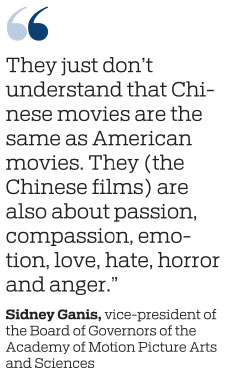China's film industry on a creative roll
Film critic and former Shanghai University professor Nie Wei still clearly remembers discussing Roland Emmerich's 2004 sci-fi disaster movie The Day After Tomorrow with students in his class more than a decade ago.
When, he recalled being asked, will China produce such a blockbuster film - full of eye-popping special effects?
His anxiety over the Chinese film industry's lagging far behind the United States was eased when he saw the domestic sci-fi epic The Wandering Earth, said Nie, now deputy chairman of the Shanghai Literary and Art Critics Association, during a forum at the ninth Beijing International Film Festival from April 13 to 20.
The Wandering Earth, China's second-highest-grossing film of all time after 2017's Wolf Warrior 2, has more than 2,000 visual-effect shots and vividly brings to life the catastrophic landscapes depicted in the book of the same name, on which the movie is based, by Hugo Award-winning novelist Liu Cixin.

"Chinese filmmakers' vitality in creation and imagination have been stimulated unprecedentedly over the past 10 years," said Nie.
With average year-on-year growth of around 30 percent from 2004 to 2016, and despite a bit of a slowdown in recent years, China reached an annual output of more than 1,000 feature-length films and grossed 61 billion yuan ($9.1 billion) in box office receipts last year, up 9.06 percent compared with 2017.
In addition, the number of screens in urban cinemas in China reached 60,079 by the end of last year, the most in the world.
"In 2012, China's box office haul was 17 billion yuan and the country had 10,000 screens. The figures signal the rise of the Chinese film industry, which has also reshaped the global cinema market," said Zhang Hong, deputy head of the China Film Association.
The improvement of the Chinese film industry is not only reflected in the market size, but also demonstrated by Chinese efforts to use the latest technologies.
Wu Guanping, a cinema research professor at the Beijing Film Academy, said he was surprised when he recently watched Taiwan auteur Tsai Ming-liang's first 8K-resolution virtual reality production, The Deserted, at a VR-themed forum at the Beijing festival.
The film, during which viewers wear VR headsets for an immersive experience, was the longest-running, at 56 minutes, among those nominated in a VR competition segment at the Venice Film Festival in 2017.
"The progress of the Chinese film industry is closely linked to the progress of China," said Wu.
For instance, China's lunar exploration Chang'e project provides the inspirational material for domestic sci-fi stories, and the authorities' openness to social livelihood issues encourages creation of films based on true stories, such as the hit Dying to Survive, added Wu.
US director Rob Minkoff, who served as the jury president of the festival's top Tiantan Awards, said he believes the rise of online content produced by streaming giants-like Netflix and Amazon will benefit the diversity of cinema.
"What's really fascinating about their business model is that they don't have to make one thing that appeals to everyone. They can make many things that appeal to a small group of people so that the viewers will continue to subscribe," said Minkoff, adding that films tailored for streaming could be unique.
Malcolm Clarke, a veteran filmmaker who has followed the development of the Chinese movie industry for several decades, said Chinese films should pursue a unique path.
Clarke, who directed the documentary Better Angels, said Chinese filmmakers "seem to be looking at an international model rather than a Chinese model," and appear to be replicating US movie models.
"What happened in China in the last 40 years is nothing short of miraculous. It's extraordinary. I think the world does not appreciate it because nobody is telling those stories," he added.
If Chinese filmmakers, producers and distributors could see that there's a real market for Chinese people to see their own stories - "the loves, the losses, the struggles, the failures, the successes of ordinary people" - they certainly would find an audience, Clarke said.
"That will be a model. And I think those movies will travel abroad and do more to put a human face on the Chinese experience. Because that's what we in the West need to know. We need to know what China is and who the people are. ... We have to encourage a new generation of filmmakers to look at their own country and find inspiration in their own country here, not across the Pacific."
Clarke called Dying to Survive, about a small drugstore owner who smuggles cheap anti-cancer medicines from India to sell to Chinese patients who cannot otherwise afford such drugs, "a fantastic Chinese story. It was about people who have faults. They are not perfect, but they are doing something good."
"That's my model of a good Chinese story, a good Chinese subject very well told," he added. "That's what I would like to encourage more Chinese financiers, distributors and exhibitors to make."
Though it's hard to predict what kind of stories will win hearts in China and abroad, Chinese filmmakers have eagerly sought a presence in overseas markets in recent years.
In 2018, 10 of the 15 highest-grossing domestic movies were distributed in North America, with Detective Chinatown 2 topping the overseas box office box charts, bringing in nearly $2 million, according to the 2019 Report on Chinese Film Art released by the China Film Association.
Chinese movies today are very different from those of the past, said Sidney Ganis, vice-president of the Board of Governors of the Academy of Motion Picture Arts and Sciences.
"Slowly and certainly," Americans are beginning to realize they should see Chinese movies, he added. "They just don't understand that Chinese movies are the same as American movies. They (the Chinese films) are also about passion, compassion, emotion, love, hate, horror and anger."
Contact the writers at xufan@chinadaily.com.cn
(China Daily Global 04/30/2019 page1)


















